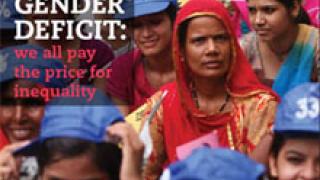
Dear Editor
In the article on global population ('Can the world handle 7 billion of us?', New World, Spring 2011), you reflect 'on whether population growth really is the defining challenge of the century'. That question can only be answered at the end of the century.
What we need to decide now is how much uncertainty is associated with growth predictions and what, if anything, the UN should be doing about it. Few would argue that the expected increase is actually beneficial. It follows that if '200m women who would like to use contraceptives lack access to them', the first thing the UN should be doing is formulating a programme to meet their needs.
It seems wholly inconceivable that you should conclude that our efforts should be directed instead 'at urban development [i.e. skyscrapers]...managing migration [i.e. persuading developed countries to increase their already-unpopular intakes] and moving towards a low-carbon world [we are unlikely to do so at the required rate]'.
David Hayes
Westbury-on-Trym
Dear Editor
Much of the impetus for uprisings in Tunisia and Egypt seemed to come from the younger generation, able to use technology effectively to expose the abuses perpetrated by their regimes. Now, in Libya, Bahrain, Yemen, Syria and elsewhere, the local populations are following their example. This 'people power' must be channelled through a democratic process.
The UN must use this window of opportunity. It should provide humanitarian assistance and help with transitional arrangements. It should advise new administrations on democratic institutions that reflect the wishes of the people. It should monitor closely developments in Israel/Palestine to avoid the unrest in the region spilling into this intractable situation. And it should facilitate justice and accountability. The Security Council's decision to refer the Gaddafi regime to the International Criminal Court is a step in the right direction and will hopefully act as a warning to other tyrannical regimes. Robert Mugabe - take note.
David J Thomas
Porthcawl
Dear Editor
It is a matter of mounting concern that New World has rarely referred to the annual sessions of the Commission on the Status of Women (CSW). The Wales Assembly of Women is an NGO accredited to the UN. Our representatives have attended every major UN world conference for women since 1985 and every CSW session. We are deeply concerned that progress in attaining human rights for women has been so limited.
Take, for example, UN Security Council Resolution 1325, which states that women should be equally represented as members of national and international bodies involved with peacekeeping and conflict resolution. Little has been heard of this measure, far less of its implementation. As for the Convention on the Elimination of All Forms of Discrimination against Women, most women have never heard of it and many men, sad to say, would probably prefer not to. It should surely be a responsibility of the UN and all associated bodies to correct this disgraceful situation.
Audrey Jones
Secretary, Wales Assembly of Women
Note from the Editor: this letter was received two weeks before this gender-themed issue of New World went to press, and we are very grateful for this feedback. UNA-UK shares the writer's concern at the lack of genuine debate and action on gender issues, in the media and in policymaking circles. This is why gender is a core policy focus for UNA-UK. Our current priorities are: support for UN Women ; women, peace and security; gender and development; and awareness and implementation of CEDAW . While New World has not reported on every CSW session, UNA-UK sends delegates every year (see this year's article by Sally Spear) and regularly features content on a range of gender and women's issues, such as UN Women (Autumn and Spring 2010), violence against women (Winter and Spring 2009), maternal mortality (Summer 2010 and Summer 2008) and UNSCR 1325 (Spring 2008).
Dear Editor
Among the horrors of the conflict in Libya was the uncovering of a massive Gaddafi-government arms installation. Close inspection revealed the origin of the weapons - China, Russia, the UK and the US, all permanent members of the UN Security Council. Far from fulfilling their mandate to maintain international peace, they are leaders of the arms trade, flooding the world with weapons! And through their Security Council veto, these self-interested nations have humankind in a political and military stranglehold.
This tragedy will only be ended by reform of the Council. The permanent members - the aforementioned four and France - need to commit themselves to the well-being of all humankind, learn to trust one another, surrender their veto in favour of majority voting, and reconstitute the Council so that it represents every region of the world. And all states need to construct together a model of a civilised nation, where governments care for the well-being of all their citizens, build friendly relations with their neighbours, and multilaterally disarm. These measures will build a truly 'United Nations'.
Reverend Malcolm Hill, Dean Rees-Evans, Danile Pampanini, Jenny Ince and Robert Milne
Sudbury
